Who was Friedrich Froebel? (1782-1852)
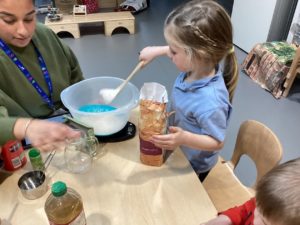
Born on 21 April 1782 Friedrich Froebel was a German educator who invented the kindergarten. He believed that “play is the highest expression of human development in childhood for it alone is the free expression of what is in the child’s soul.” According to Froebel, in play children construct their understanding of the world through direct experience with it. His ideas about learning through nature and the importance of play have spread throughout the world.
Froebel considered the whole child’s, health, physical development, the environment, emotional well-being, mental ability, social relationships and spiritual aspects of development as important. Drawing on his mathematical and scientific knowledge Froebel developed a set of gifts (wooden blocks 1-6) and introduced occupations, (including sticks, clay, sand, slates, chalk, wax, shells, stones, scissors, paper folding). It seems appropriate to mention Froebel’s gifts and occupations in conjunction with this new course. Particularly as the gifts and occupations are open-ended and can be used to support children’s self-initiated play.
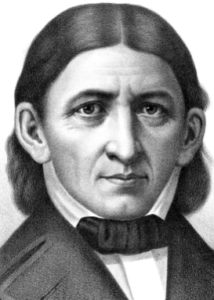
Froebel believed that it was important for practitioners to understand the principles of observation including professional practice, the multiple lenses through which they see children- and that children see their worlds, as well as offering children freedom with guidance and considering the children’s environments including people and materials as a key element of how they behave.
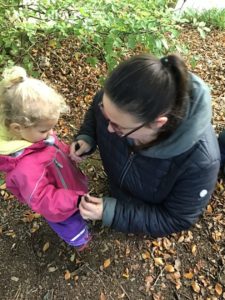
Because Froebel based much of his understanding of children on observing them this has changed the way we think about children’s play.
Principles
Froebelian principles as articulated by Professor Tina Bruce (1987, 1st edition and 2015, 5th edition).
1. Childhood is seen as valid in its self, as part of life and not simply as preparation for adulthood. Thus education is seen similarly as something of the present and not just preparation and training for later.
2. The whole child is considered to be important. Health – physical and mental is emphasised, as well as the importance of feelings and thinking and spiritual aspects.
3. Learning is not compartmentalised, for everything links.
4. Intrinsic motivation, resulting in child-initiated, self-directed activity, is valued.
5. Self- discipline is emphasised.
6. There are especially receptive periods of learning at different stages of development.
7. What children can do (rather than what they cannot do) is the starting point in the child’s education.
8. There is an inner life in the child, which emerges especially under favourable conditions.
9. The people (both adults and children) with whom the child interacts are of central importance.
10. Quality education is about three things: the child, the context in which learning takes place, and the knowledge and understanding which the child develops and learns.
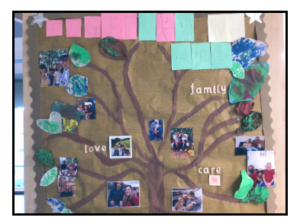
A Froebelian principled approach to early childhood education in practice
• It is important that practitioners offer children what they need now. For example, some children may need to be allowed the autonomy, (to make choices and decisions and to use their skills and techniques) to mix their own paints. While other children may not be ready to mix paints for themselves, and will just waste expensive resources if they are allowed to ladle paint everywhere, and splash water onto it, but they may be ready to learn how sand, clay and gravel behave when in contact with water. They can learn about the properties of materials. Another child may be ready to mix paints, but may need a great deal of practitioner support as they are in the early stages of learning how to do this.
• The practitioner must nurture the ideas, feelings, relationships and physical development and embodiment of children. The practitioner needs to be able to recognise when children need personal space or need to be diverted into something appropriate for them without making them feel bad about using the paints inappropriately, because they couldn’t yet understand. Children need to be given help sensitively, in a way which will build their confidence, skills and autonomy.
• All children learn in ways which can be linked with The official framework documents of their country, such as the areas of learning in The Curriculum for Excellence.
• Children are self-motivated when they are encouraged to be so and their intrinsic motivation to learn is not crushed, but nurtured by practitioners that have an understanding of them.
• Children are encouraged to develop self-discipline. This helps children to concentrate well, and to learn effectively. It also relates understanding of self, others and the universe.
• Children need to be given choices, allowed to make errors, decisions and offered sensitive help as and when it is needed, This will help children to learn in ways which are right for each of them as individuals. In this way practitioners are supporting and also extending their learning.
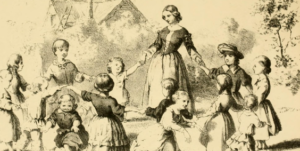
• Practitioners need to place emphasis on what the children can do, rather than what they can’t do. The tone and atmosphere should be encouraging and not judgemental or critical. This Froebel believed builds self-esteem and confidence. In other words at every stage children need to be that stage – with adults providing opportunities for them to practise and apply what they know and can do.
• Children need to be given personal space to construct, build and model. However children also benefit from lots of talking with the practitioner about what they are doing and going to do. Language, talking and listening to each other, is an important and central way in which children become symbol users.
• When it comes to taking a Froebelian approach to observing children. It might look as if the practitioners are only there in the background, but in fact they are central. Practitioners working with young children, either in group setting or in a home based setting, are key to helping children develop and learn. Practitioners create warm affectionate atmospheres, which open children up to learning and help children to know themselves, respect themselves, like themselves, and engage with their learning very positively.
• Froebel believed that practitioners also create the physical environment both indoors and outdoors. He points out how important it is for children to learn without external pressures from practitioners. The people we meet, the environment and atmosphere, are as important as what we learn. We do our best work with helping children to develop and learn when we observe what they find of interest, and what they show us they would be interested to learn. This is the base on which we can build what we need children to know, understand and learn in order to participate fully in their community and the wider world.
Frobel’s Theory of a Child’s Community at Overlee Family Centre
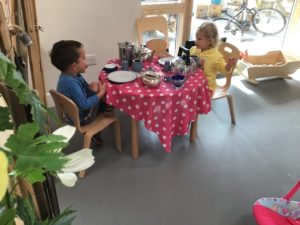
Froebel believed in the importance of the family in the education of the child, but he saw that parents need to be supported by the community. This is resonant with the saying that it takes a whole village to bring up a child. Therefore at Overlee we valued the importance of engaging with everyone in the children’s community including parents, siblings, family members, and wider member of the community such as local library to create a secure and trusting environment for our children to learn and thrive. Involving the children’s community in their play to promote a sense of Togetherness in the children’s world.
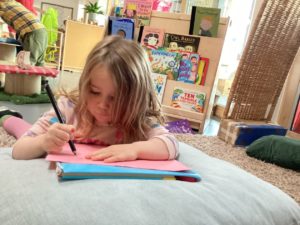
Froebel advocated freedom with guidance and his ideas about learning through nature and the importance of play are well known throughout the world.
The right to play is enshrined in the UN Convention on the Rights of the Child and the importance of ensuring children have opportunities and spaces to play, where they feel safe and can enjoy themselves without adult direction, is now widely accepted.
Despite its many benefits, statistics show that the amount of time children get to play has been declining for decades. Tightly structured family and school schedules, more parents working outside the home, fewer safe places to play, and rising media use and screen time are among the reasons.
With this general decline in freedom for young children, Froebel’s teachings on nature, unity, connectiveness and risk taking seem to be more pertinent than ever, and many parents, carers and practitioners are looking at his principles to guide their practice and responses to young children.
“Play is about wallowing in ideas, feelings and relationships and the prowess of the physical body“. – Tina Bruce

